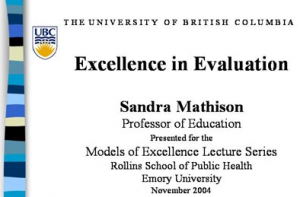The important “point of view” in evaluation is the context that provides the reference for making judgements about the quality of an evaluand.
There are a limited number of points of view that one might take in doing evaluation–some obvious ones are aesthetic, economic, political, religious. A POV is universal, i.e., for everyone and every culture there is each of these points of view. When one takes a POV, one necessarily takes certain criteria and indicators to be primary. For example, an economic point of view assumes things like markets, monetary value, and the like. Even though a POV is universal, within any POV there are potentially many orientations. Again using economics as an example, there are Marxist, free market, neo-liberal, fascist, and so on orientations.
Every evaluation is done from a particular POV and a particular orientation. Evaluators and all evaluand stakeholders will find evaluation more defensible and useful if there is clarity and agreement about what the POV and orientation for a particular evaluation is. Disagreement about assertions of value or dis-value are dependent on the context, from the point of view.
 Follow
Follow



